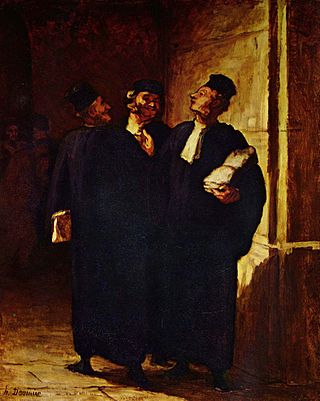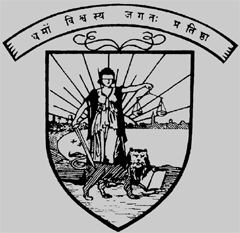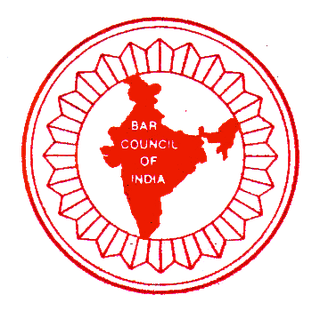Related Research Articles

An advocate is a professional in the field of law. Different countries and legal systems use the term with somewhat differing meanings. The broad equivalent in many English law–based jurisdictions could be a barrister or a solicitor. However, in Scottish, Manx, South African, Italian, French, Spanish, Portuguese, Scandinavian, Polish, Israeli, South Asian and South American jurisdictions, "advocate" indicates a lawyer of superior classification.
A bar association is a professional association of lawyers as generally organized in countries following the Anglo-American types of jurisprudence. The word bar is derived from the old English/European custom of using a physical railing to separate the area in which court business is done from the viewing area for the general public.

Legal education is the education of individuals in the principles, practices, and theory of law. It may be undertaken for several reasons, including to provide the knowledge and skills necessary for admission to legal practice in a particular jurisdiction, to provide a greater breadth of knowledge to those working in other professions such as politics or business, to provide current lawyers with advanced training or greater specialisation, or to update lawyers on recent developments in the law.
A Bachelor of Laws is an undergraduate law degree offered in most common law countries as the primary law degree and serves as the first professional qualification for legal practitioners. This degree requires the study of core legal subjects and jurisprudence to provide a comprehensive understanding of the legal system and its function. The LLB curriculum is designed to impart a thorough knowledge of legal principles, legal research skills, and a sound understanding of the roles and responsibilities of lawyers within society. This degree is often a prerequisite for taking bar exams or qualifying as a practising lawyer, depending on the jurisdiction. Additionally, the LLB program also serves as a foundation for further legal education, such as a Master of Laws (LLM) or other postgraduate studies in law.
A bar examination is an examination administered by the bar association of a jurisdiction that a lawyer must pass in order to be admitted to the bar of that jurisdiction.
A patent attorney is an attorney who has the specialized qualifications necessary for representing clients in obtaining patents and acting in all matters and procedures relating to patent law and practice, such as filing patent applications and oppositions to granted patents.

A law school is an institution, professional school, or department of a college or university specializing in legal education, usually involved as part of a process for becoming a judge, lawyer, or other legal professional within a given jurisdiction. Depending on the country, legal system, or desired qualifications, the coursework is undertaken at undergraduate, graduate, or both levels.
The Ziauddin University ; abbreviated as ZU) is a private university located in Karachi, Sindh, Pakistan. The university is named after the educationist, Ziauddin Ahmad.
An admission to practice law is acquired when a lawyer receives a license to practice law. In jurisdictions with two types of lawyer, as with barristers and solicitors, barristers must gain admission to the bar whereas for solicitors there are distinct practising certificates.

The Government Law College, Mumbai,, India, founded in 1855, is the oldest law school in Asia. The college, affiliated to the University of Mumbai, is run by the Government of Maharashtra.

Bar Council of India (BCI) is a statutory body established under section 4 of the Advocates Act 1961 that regulates the legal practice and legal education in India. Its members are elected from amongst the lawyers in India and represent the Indian bar. It prescribes standards of professional conduct, etiquettes and exercises disciplinary jurisdiction over the bar. It also sets standards for legal education and grants recognition to universities whose law degrees will qualify students to enrol themselves as advocates upon graduation.

Sri Lanka Law College, formerly known as Ceylon Law College, is a law college, and the only legal institution where one can enroll as an Attorney-at-Law in Sri Lanka. It was established in 1874, under the then Council of Legal Education, in order to impart a formal legal education to those who wished to become Advocates and proctors in Ceylon. The main building of the college was constructed in 1911. It is located on Hulftsdorp Street in Colombo, Sri Lanka. As of late 2021, the current principal is Dr. Athula Pathinayake.

National Testing Service - Pakistan (NTS) is a nonprofit organization in Pakistan that administers academic performance evaluation tests. It is similar to Educational Testing Service (ETS) in the United States. NTS is a member of the International Association for Educational Assessment. It is also recognized by the Higher Education Commission.
Legal education in India generally refers to the education of lawyers before entry into practice. Legal education in India is offered at different levels by the traditional universities and the specialised law universities and schools only after completion of an undergraduate degree or as an integrated degree.

Army Institute of Law (AIL) is a private law school in Mohali, Punjab, India. The institute is affiliated to Punjabi University, Patiala, and is run by the Army Welfare Education Society (AWES). The institute has a moderately sized campus in Sector 68, Mohali. The hostels can house 400 students.
Medical & Dental College Admission Test (MDCAT) is a paper based test conducted in Pakistan and internationally each year for those who want to pursue undergraduate medical and dental education in Pakistan. It is a pre-requisite for admission in all medical and dental colleges in Pakistan.

The University of Turbat is a public university situated in Turbat, Balochistan, Pakistan.
Bar Council of Uttarakhand is the regulatory and statutorily representative body for lawyers practicing law in the state of Uttarakhand. It was constituted as per the mandatory requirement as per Advocates Act, 1961 and Bar Council of India. In March 1953, S. R. Das as head of the 'All India Bar Committee', proposed the creation of the apex body as an All India Bar Council and Bar council at state levels and submitted a report to the Union Government of India. Members of the Bar Council are elected from among members enrolled and practicing as lawyers practicing law in the state of Uttarakhand and they represent the state in Bar Council of India meetings. Bar Council of a place designs standards of professional conduct to be followed by members, and designs etiquettes and has the power to enforce disciplinary guidelines over the members of bar council.

Punjab University Law College (PULC) is a Public Sector Law College of University of the Punjab, Canal Road (Quaid e Azam) Campus, Lahore. It is the oldest law institute in Pakistan which was established in 1868 (14 years before Punjab University itself). It was the first institute offering legal education to be established in a Muslim majority area of the Subcontinent. Since then, it has produced some of the most prominent lawyers, activists, statesmen, judges, bureaucrats and politicians. Today, the institute is known for its rich history, high quality education and renowned Alumni.